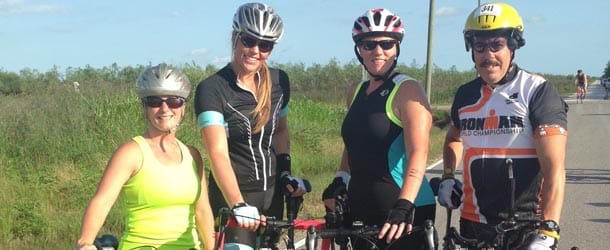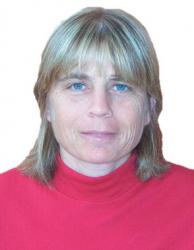Former Softball Olympic Medalist Jennie Finch Trained With Local Ironman Dave Park To Prepare for The Aquafor Triathlon in NYC, Then Bested Her Goal Time By 15 Minutes
By Karla Wall
What does a two-time Olympian do to get back in shape after having her third child? Train for a triathlon, naturally.
When I met with former Olympic softball medalist Jennie Finch (she won the gold medal as pitcher of the US Women’s Softball Team in 2004, and the silver in 2008) and Ironman triathlete Dave Park at Finch’s home in Sulphur, they had just come off a long bike training ride and were busy disassembling and packing Finch’s custom bike for a trip to New York City, where Finch would compete as spokesperson for the Aquafor Triathlon July 14, a mere four and a half months after the birth of her daughter, Paisley.
For Finch, triathlons are simply another way to stay in shape, stay in the game, and challenge herself.
“It’s a challenge — something new,” she says. “It allows me to be a full-time mom, but still compete.”
A New Direction
Finch’s road to triathlete status probably began, she says, when she ran the NYC Marathon in 2011 as a representative of Timex.

Finch and 9-year-old Maddie (granddaughter of Dave Park) after the finish of the T-Gator Triathlon July 7. It was Maddie’s first triathlon.
Finch started the race in dead last position, and Timex donated $1 for every runner she passed. She passed more than 30,000 runners en route to a 4:05:26 finish.
Finch returned home from that race and began seriously training for marathons with local runner Lori Pritchett, whom she met at a fundraiser swim meet at the Sulphur Parks and Recreation pools. The two would become fast friends and training partners, and, eventually, the two of them started talking about training for triathlons.
“I’d never thought about doing a full triathlon,” Finch says. “but now that I had a training partner, I began to really consider it.”
When Finch agreed to run the Aquafor triathlon, she and Pritchett began training in earnest. For help with the bike portion of the training, they turned to Capital Cyclery in Lake Charles.
“They told me, ‘you know, you ought to talk to Dave Park,’” Finch says.
Park would be the perfect guy to talk to, indeed. A local triathlete, Park’s resume includes finishing none other than the 2011 Ironman Triathlon in Hawaii, as well as the International Triathlon Union’s World Championship Race in Beijing, and the Escape from Alcatraz triathlon in San Francisco. He’s competed in over a hundred other local races including the T-Gator mini-triathlon at Sam Houston Jones State Park, and races in Kemah, Texas, and in Houston. That’s all the more incredible when you consider he’s over age 60, a point of life at which most are becoming well acquainted with the armchair or sofa.
Finch had found the perfect local coach. And Park, who has begun volunteer coaching numerous triathletes in the area, welcomed the opportunity to help.
“It’s an honor to work with her,” he says. “She’s got such natural athletic ability. And she picks everything up so quickly.”
Park says he enjoys working with those new to the sport.
“I love watching them finish their first triathlons,” he says. “There’s a lot to this sport, and I enjoy helping people get into it. It keeps me young and motivated.”

On July 14, Finch finished the Aquafor Triathlon in New York in two hours, 51 minutes, well ahead of her goal of 3 hours, 6 minutes.
“I’d be lost without Dave,” says Finch. “Every day I learn something new from him.” Park has been, in coordination with Finch’s official coach, Olympic triathlon coach Gale Bernhardt, working with Finch on such areas as swim stroke technique; the ‘rules of the road’ for the biking portion of the race; how to transition from one part of the race to another (not an easy feat, that — going from the swimming portion to the biking portion, for instance, involves an intricate choreography of changing equipment and clothing); how to break down, pack, and put back together the bike.
“He’s taught me so much about what gear to buy and how best to use it,” Finch says.
He’s also given her great advice on “fueling” during the race — what energy boosters to use and when to take them.
“There’s a lot to this sport,” Park says.
While Park says he’s “more peer support than coach,” Finch begs to differ.
“He’s definitely a coach. It just never comes across that way.”
Finch and Park swim 2,000-2,500 yards on Mondays, Wednesdays and Fridays, mostly at the SPAR pool, but they also do open-water swims in Lake Charles and in a local pond. On Tuesdays, Thursdays and Saturdays, they bike 20-30 miles and follow that up with a run of 1-2 miles. This combination, Park says, is called a “brick.”
“That’s what your legs feel like when you get off the bike and begin running,” Park grins. “They feel like bricks.”
One day a week, Park says, is dedicated to a run of 6-8 miles.
Finding Time — And The Fear Of Monsters
That kind of schedule is difficult for anyone, much less someone with Finch’s obligations — she’s a rep for several products and corporations; she’s got a young family. On the morning I visited, she’d gotten in after midnight from a business trip, gotten a couple of hours of sleep, and done the training ride. As she talks with me, she alternates between holding Paige, cuddling with her middle son, Diesel, and even scrambling an egg for a late breakfast.
“Jennie definitely needs flexibility in her training schedule,” Park says. And, indeed, finding time to train is one of the biggest difficulties she has with being a triathlete.
She’s also had to learn how to build endurance, something softball didn’t call for quite on the level of a triathlon.
“I’m still building up endurance,” she says. “(Park) and I will be riding, and I’ll be thinking ‘this is killing me,’ and (Park) will not even be huffing and puffing,” she says.
There’s also the issue of open-water swimming — a very different experience than swimming laps.
“I have a definite fear of open-water swimming,” Finch says. “It’s very intimidating. You have to overcome that fear of ‘creatures.’ There are snakes, alligators, sea life.”
But, she says, she’s been able to do a half-mile swim in open water, so she was confident she could conquer that fear for the Aquafor triathlon.
The Payoff
Finch and Park’s hard work has so far paid off well. Finch placed second overall in the Women’s division at the T-Gator triathlon on July 7. And, on July 14, she finished the Aquafor Triathlon in New York in two hours, 51 minutes, well ahead of her goal of 3 hours, 6 minutes. And the swimming went off without a hitch, thanks to a friendly current — and a lack of monster encounters.
“She had been hoping to swim 1,500 meters in 30-33 minutes,” Park says. “She swam it in 19.”
What’s next for Finch?
Park says he’s trying to talk her into entering a half-triathlon in Galveston later this year, and she’s talked about possibly training for an Ironman qualifier event, or a half-Ironman.
“I don’t want to sacrifice too much family time,” Finch says. “We’ll just have to play it by ear.”
This story originally appeared in the July 18, 2013 edition of Lagniappe Magazine.
















Comments are closed.